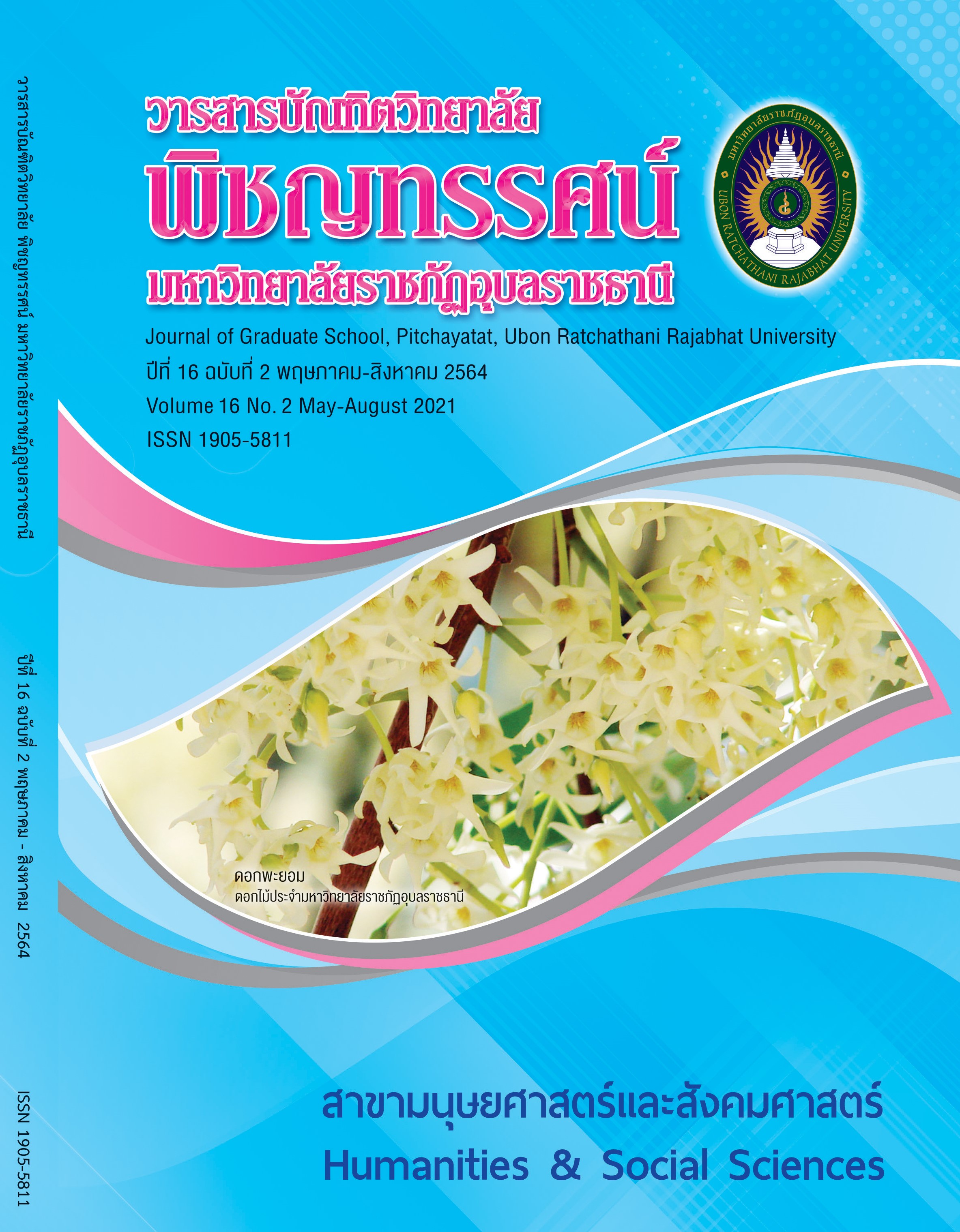การศึกษาประสิทธิภาพของการจัดการเรียนการสอนตามหลัก 6 ประการในการสอน แบบมืออาชีพให้แก่ผู้เรียนภาษาอังกฤษ
คำสำคัญ:
หลัก 6 ประการในการสอนแบบมืออาชีพให้แก่ผู้เรียนภาษาอังกฤษ, สมาคมครูผู้สอนภาษาอังกฤษแห่ง ประเทศไทย, แผนการสอน, ภาษาอังกฤษเพื่อทักษะการเรียนรู้บทคัดย่อ
งานวิจัยนี้มีวัตถุประสงค์เพื่อ 1) พัฒนาแผนการสอนในรายวิชาภาษาอังกฤษเพื่อทักษะการเรียนรู้ตามแนวคิดหลัก 6 ประการในการสอนแบบมืออาชีพให้แก่ผู้เรียนภาษาอังกฤษของสมาคม TESOL 2) ศึกษาประสิทธิภาพแผนการสอนที่ได้จัดพัฒนา 3) เปรียบเทียบแบบทดสอบผลสัมฤทธิ์ทางการอ่านก่อนและหลังเรียนจากการจัดการเรียนรู้ตามแผนการสอนที่พัฒนาขึ้น และ 4) ศึกษาความพึงพอใจของผู้เรียนตามแผนการสอนที่พัฒนาขึ้น ตัวอย่าง คือ นักศึกษามหาวิทยาลัยราชภัฏอุบลราชธานีที่ลงทะเบียนเรียนในรายวิชาภาษาอังกฤษเพื่อทักษะการเรียนรู้ ในภาคเรียนที่ 1 ปีการศึกษา 2563 จำนวนทั้งสิ้น 40 คน ได้มาโดยการสุ่มตัวอย่างแบบง่าย เครื่องมือที่ใช้ในการวิจัย คือ แบบทดสอบผลสัมฤทธิ์ทางการอ่านก่อนและหลังเรียน แบบทดสอบกิจกรรมระหว่างเรียน และแบบประเมินความพึงพอใจในการจัดการเรียนรู้ตามแผนการสอนที่ได้พัฒนาขึ้น สถิติที่ใช้ ได้แก่ ร้อยละ ค่าเฉลี่ย ส่วนเบี่ยงเบนมาตรฐาน และการทดสอบทีแบบกลุ่มสัมพันธ์
ผลการวิจัยพบว่า
- แผนการสอนจำนวน 4 แผนในรายวิชาภาษาอังกฤษเพื่อทักษะการเรียนรู้ตามแนวคิดหลัก 6 ประการในการสอนแบบมืออาชีพให้แก่ผู้เรียนภาษาอังกฤษของสมาคม TESOL ประกอบด้วย 1) เนื้อหา 2) การจัดการเรียนรู้ตามแนวคิดหลัก 6 ประการในการสอนแบบมืออาชีพให้แก่ผู้เรียนภาษาอังกฤษของสมาคม TESOL 3) สื่อและแหล่งเรียนรู้ และ 4) การวัดและประเมินผล
- แผนการสอนที่จัดทำขึ้นมีประสิทธิภาพ (E1/E2) เท่ากับ 80.63/80.81
- ผลการเปรียบเทียบแบบทดสอบผลสัมฤทธิ์ทางการอ่านก่อนและหลังเรียนจากจัดการเรียนรู้ตามแผนการสอนที่จัดทำขึ้นมีคะแนนเฉลี่ยหลังเรียนสูงกว่าก่อนเรียนที่ระดับนัยสำคัญที่ 0.05
- ตัวอย่างมีความพึงพอใจในการสอนตามแผนการสอนที่จัดทำขึ้นในภาพรวมในระดับมากที่สุด (= 4.52, S.D. = 0.59)
เอกสารอ้างอิง
กุลจิรา รักษนคร และคณะ. “พัฒนาแผนการจัดการเรียนรู้ กลุ่มสาระการงานอาชีพและเทคโนโลยี หน่วยการเรียนรู้ เรื่อง กินดี มีสุข ระดับชั้นประถมศึกษาปีที่ 6,” ศึกษาศาสตร์มหาวิทยาลัยขอนแก่น. 33, 4 (ตุลาคม-ธันวาคม 2553): 51-59.
ขัณธ์ชัย อธิเกียรติ และธนารักษ์ สารเถื่อนแก้ว. การสอนแบบทันสมัยและเทคนิควิธีสอนแนวใหม่. สงขลา: สำนักส่งเสริมวิชาการและงานทะเบียน, มหาวิทยาลิยราชภัฏสงขลา, 2559.
พรศิริ อูปคำ และยุทธศักดิ์ ชื่นใจชน. การศึกษาเปรียบเทียบผลสัมฤทธิ์การเรียนรู้คำศัพท์โดยใช้ และไม่ใช้คำอุปสรรค ในวิชาภาษาอังกฤษของนักเรียนชั้นมัธยมศึกษาปีที่ 3. วิทยานิพนธ์ปริญญาการศึกษามหาบัณฑิต สาขาวิชาภาษาอังกฤษ คณะศึกษาศาสตรมหาวิทยาลัยนเรศวร, 2558.
สุณิสา เกียวกุล. การศึกษาผลสัมฤทธิ์ทางการเรียนภาษาอังกฤษเพื่อการสื่อสารของนักเรียนชั้นประถมศึกษาปีที่ 5. วิทยานิพนธ์ศึกษาศาสตรมหาบัณฑิต สาขาวิชาหลักสูตรและการนิเทศ มหาวิทยาลัยศิลปากร, 2548.
สุภัทรา ภูษิตรัตนาวดี. การพัฒนารูปแบบการจัดการเรียนรู้เชิงรุกสำหรับคณาจารย์วิทยาลัยเทคโนโลยีภาคใต้. ปริญญาปรัชญาดุษฎีบัณฑิต สาขาวิชาการวิจัยพฤติกรรมศาสตร์ประยุกต์ มหาวิทยาลัยศรีนครินทรวิโรฒ, 2560.
Bonwell, C.C. Active Learning: Creating Excitement in the Classroom AEHE-ERIC Higher Education Report No.1. Washington, D.C.: Jossey–Bass, 1991.
Duffy, T. M., and D.J. Cunningham. Constructivism: Implications for the Design and Delivery of Instruction. New York: Macmillan Library Reference USA, 1996.
Echevarria, J. How Does SIOP Align with TESOL’s 6 Principles?. (online) 2018 (cited September 2020). Available from: https://www.janaechevarria.com/?p=1138 Fedler, R.M. and R. Brent. “Active - inductive - Cooperative Learning: An instructional Model for Chemistry,” Journal of Chemical Education. 73, (September 1996): 832–836.
Hagar, Trenton. “Practical Applications of TESOL's The 6 Principles for Exemplary Teaching of English Learners,” English Teaching Forum. 57, 1 (January 2019): 44-52.
Mehrotra, C, M. and L.S. Wagner. Aging and Diversity: An Active Learning Experience. New York: Routledge, 2009.
Oxford, R. Language Learning Strategies: What Every Teacher Should Know. New York: Newbury House Publishers, 1990.
Oxford, R. Language Learning Strategies: What Every Teacher Should Know. New York: Harper Collins, 1992.
TESOL International Association (TESOL). The 6 principles for exemplary teaching of English learners: Grades K–12. Alexandria, VA: TESOL International Association, 2018.
TESOL Writing Team. The 6 Principles for Exemplary Teaching of English Learners. Chicago: TESOL Press, 2018.
ดาวน์โหลด
เผยแพร่แล้ว
รูปแบบการอ้างอิง
ฉบับ
ประเภทบทความ
สัญญาอนุญาต
บทความทุกเรื่องได้รับการตรวจความถูกต้องทางวิชาการโดยผู้ทรงคุณวุฒิภายนอกอย่างน้อย 3 คน ความคิดเห็นในวารสารพิชญทรรศน์เป็นความคิดเห็นของผู้นิพนธ์มิใช่ความคิดเห็นของผู้จัดทำ จึงมิใช่ความรับผิดชอบของวารสารพิชญทรรศน์ และบทความในวารสารพิชญทรรศน์สงวนสิทธิ์ตามกฎหมายไทย การจะนำไปเผยแพร่ต้องได้รับอนุญาตเป็นลายลักษณ์อักษรจากกองบรรณาธิการ





